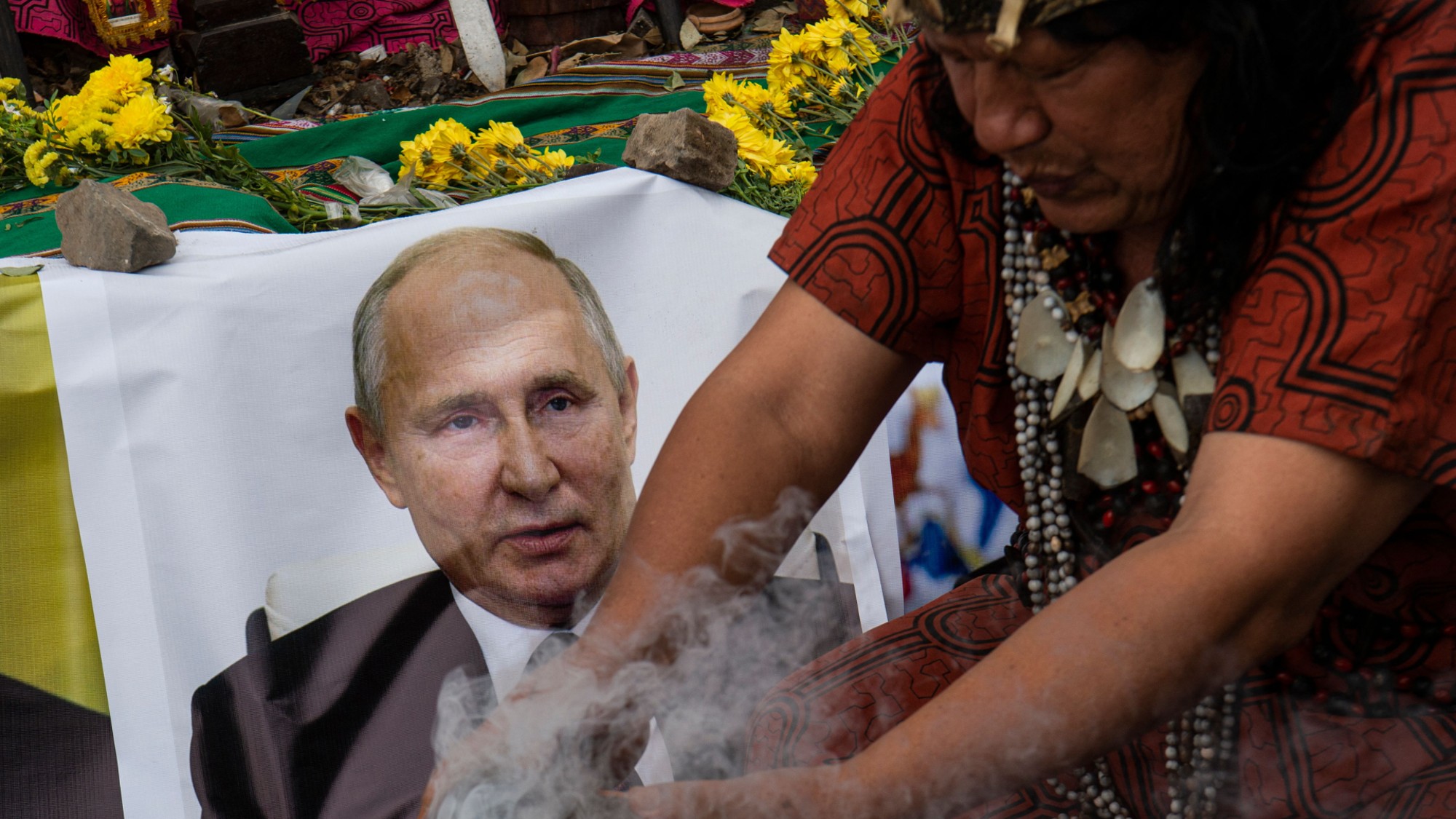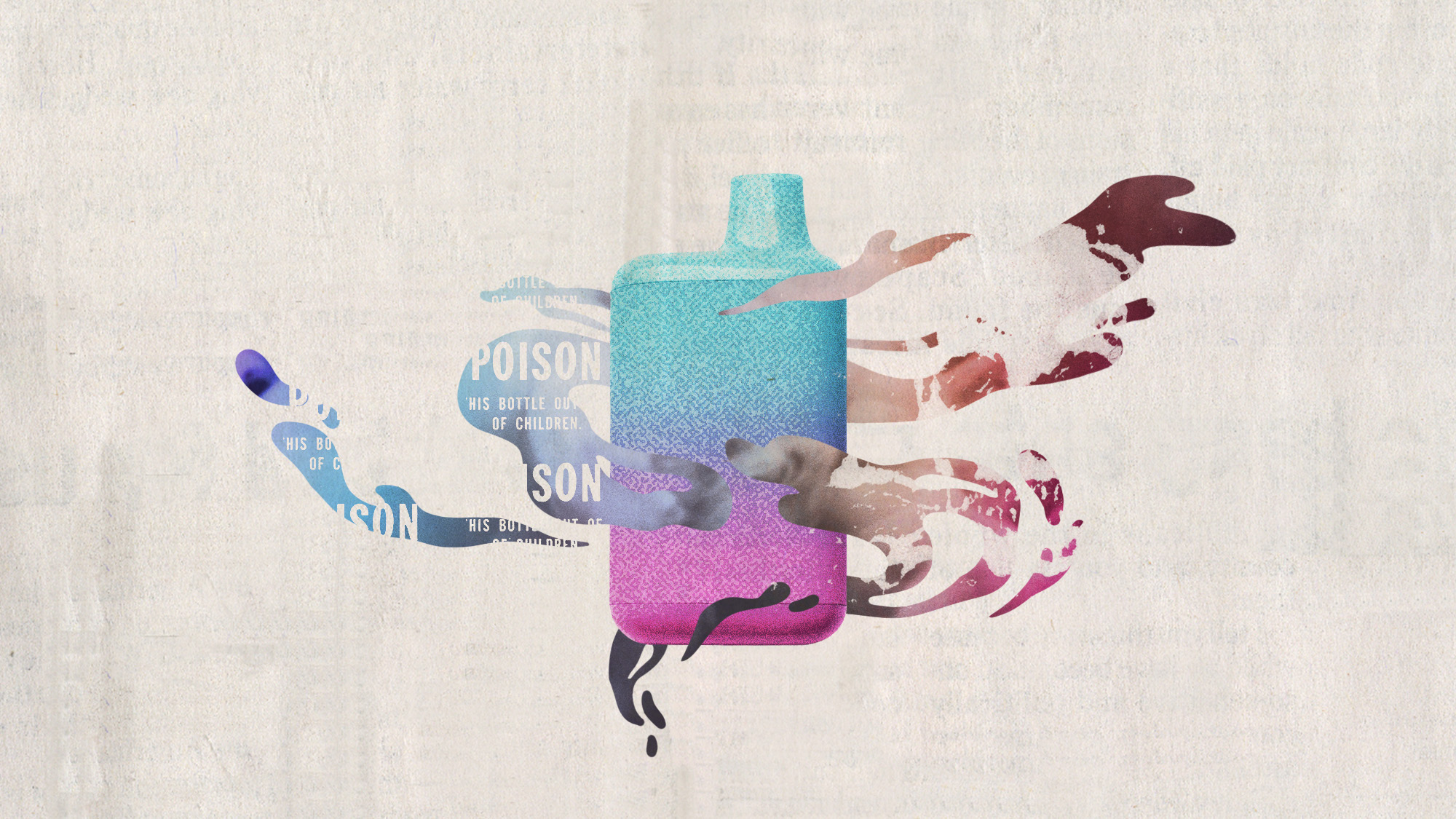Putin's fixation with shamans
Secretive Russian leader, said to be fascinated with occult and pagan rituals, allegedly asked for blessing over nuclear weapons

A free daily email with the biggest news stories of the day – and the best features from TheWeek.com
You are now subscribed
Your newsletter sign-up was successful
Vladimir Putin allegedly met shamans during his recent trips to Siberia and Mongolia to seek their blessing for the use of nuclear weapons, according to Russian opposition figures.
The Russian president is well known for performing religious orthodoxy, casting himself as a defender of Christianity around the world. The former KGB officer is also reportedly extremely superstitious, known for refusing to publicly say the name of the deceased opposition leader Alexei Navalny. He is also said to be interested in paganism, allegedly taking regular baths in an extract from the blood of severed deer antlers in the belief that it has rejuvenating powers.
But this month Putin travelled to Mongolia, his first visit to a member state of the International Criminal Court since it issued a warrant for his arrest last year. En route he stopped in the Tuva region of Siberia, "ostensibly to give a lesson in patriotism to schoolchildren", said The Times. According to Mikhail Zygar, founder of opposition television channel TV Dozhd (which is banned in Russia), Putin's real reason for the "risky trip" was to consult shamans – allegedly to seek their blessing for the use of nuclear weapons.
The Week
Escape your echo chamber. Get the facts behind the news, plus analysis from multiple perspectives.

Sign up for The Week's Free Newsletters
From our morning news briefing to a weekly Good News Newsletter, get the best of The Week delivered directly to your inbox.
From our morning news briefing to a weekly Good News Newsletter, get the best of The Week delivered directly to your inbox.
Land of ice and shamans
Mongolia and Tuva are considered home to the most powerful shamans in the world, wrote Zygar, the author of several books about the Kremlin, in Der Spiegel. Putin combines his interest in Orthodox mysticism with pagan traditions.
The secretive leader allegedly sought the advice of mystics before launching the full-scale invasion of Ukraine in 2022. "All of them assured him of a military victory," said Zygar. Last year Russian state media reported that Kara-ool Dopchun-ool, known as Russia's "supreme shaman", had asked "the sun, the moon and the stars" to protect the Kremlin's troops in Ukraine.
Putin has also made regular trips to Tuva with his former defence minister Sergei Shoigu, who was born there, to participate in pagan rituals, according to Zygar.
"It was Shoigu who first brought Vladimir Putin into contact with shamans," Zygar wrote. After Putin returned from Mongolia, said Zygar, rumours began to spread that he had sought shamans' blessings for the use of nuclear weapons because he was afraid of "angering the spirits".
A free daily email with the biggest news stories of the day – and the best features from TheWeek.com
The alleged meetings, which have not been confirmed, are said to have been organised by Putin's close ally Mikhail Kovalchuk, the head of Russia's Kurchatov nuclear research institute and a member of the Russian Academy of Sciences.
Russia's obsession with the occult
Putin is "interested in the question of his own longevity, as well as reincarnation", wrote Abbas Gallyamov, political analyst and former Kremlin speechwriter, according to The Times.
But his eclectic interests are far from unusual in his homeland. There is a "deep vein of mysticism, occultism and conspiracy theory in Russian culture", said The Spectator. There are even said to be more occult faith healers than medical doctors.
Longstanding rumours suggest Russian officials consult fortune-tellers and astrologers. There are also rumours of "secret altars" where Putin "presides over martial sacrifices". Some suggest that Putin's hiking holidays with Shoigu to Siberia have "nothing to do with the stunning scenery or clean air, and everything to do with the quest for Shambhala, a mystical land supposed to hold secrets of immortality".
In 2019, a self-described "shaman warrior" set out from Siberia to Moscow to exorcise the "demonic" Putin, said Politico.
Aleksandr Gabyshev planned to walk 8,300 kilometres before arriving at the Kremlin in 2021. "God told me that Putin is not a man, that he is a demon, and that I must exorcise him," said Gabyshev during his journey. "There can be no democracy with the demon [in power]."
But after travelling about 3,000 kilometres he came up against the limits of Russian democracy, when he was arrested and confined to a psychiatric hospital. He has been there ever since.
"While a Western public may find the shaman's exorcism quest funny," said The Washington Times, "Mr Putin does not."
Harriet Marsden is a senior staff writer and podcast panellist for The Week, covering world news and writing the weekly Global Digest newsletter. Before joining the site in 2023, she was a freelance journalist for seven years, working for The Guardian, The Times and The Independent among others, and regularly appearing on radio shows. In 2021, she was awarded the “journalist-at-large” fellowship by the Local Trust charity, and spent a year travelling independently to some of England’s most deprived areas to write about community activism. She has a master’s in international journalism from City University, and has also worked in Bolivia, Colombia and Spain.
-
 What is the endgame in the DHS shutdown?
What is the endgame in the DHS shutdown?Today’s Big Question Democrats want to rein in ICE’s immigration crackdown
-
 ‘Poor time management isn’t just an inconvenience’
‘Poor time management isn’t just an inconvenience’Instant Opinion Opinion, comment and editorials of the day
-
 Bad Bunny’s Super Bowl: A win for unity
Bad Bunny’s Super Bowl: A win for unityFeature The global superstar's halftime show was a celebration for everyone to enjoy
-
 Putin’s shadow war
Putin’s shadow warFeature The Kremlin is waging a campaign of sabotage and subversion against Ukraine’s allies in the West
-
 Alexei Navalny and Russia’s history of poisonings
Alexei Navalny and Russia’s history of poisoningsThe Explainer ‘Precise’ and ‘deniable’, the Kremlin’s use of poison to silence critics has become a ’geopolitical signature flourish’
-
 US, Russia restart military dialogue as treaty ends
US, Russia restart military dialogue as treaty endsSpeed Read New START was the last remaining nuclear arms treaty between the countries
-
 What happens now that the US-Russia nuclear treaty is expiring?
What happens now that the US-Russia nuclear treaty is expiring?TODAY’S BIG QUESTION Weapons experts worry that the end of the New START treaty marks the beginning of a 21st-century atomic arms race
-
 Epstein files topple law CEO, roil UK government
Epstein files topple law CEO, roil UK governmentSpeed Read Peter Mandelson, Britain’s former ambassador to the US, is caught up in the scandal
-
 Mexico’s vape ban has led to a cartel-controlled black market
Mexico’s vape ban has led to a cartel-controlled black marketUnder the Radar Cartels have expanded their power over the sale of illicit tobacco
-
 Iran and US prepare to meet after skirmishes
Iran and US prepare to meet after skirmishesSpeed Read The incident comes amid heightened tensions in the Middle East
-
 Israel retrieves final hostage’s body from Gaza
Israel retrieves final hostage’s body from GazaSpeed Read The 24-year-old police officer was killed during the initial Hamas attack